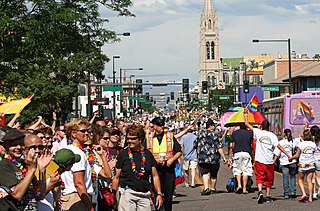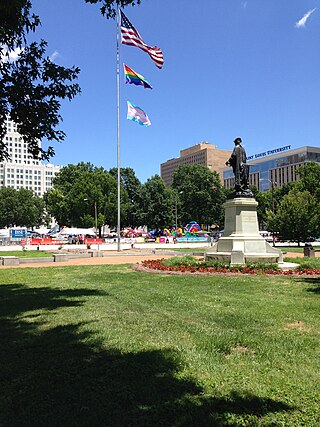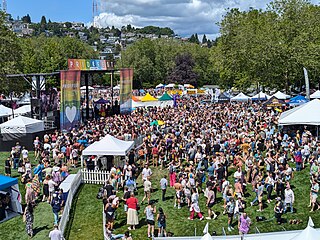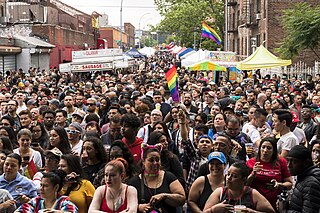Related Research Articles

The San Francisco Lesbian, Gay, Bisexual, and Transgender Pride Celebration, usually known as San Francisco Pride, is a pride parade and festival held at the end of June most years in San Francisco, California, to celebrate the lesbian, gay, bisexual, and transgender (LGBT) people.

PrideFest is an annual gay pride event held each June in Denver, honoring the culture and heritage of the lesbian, gay, bisexual, and transgender community in the State of Colorado. The first "Pride" event in Denver, known as Gay Pride Week, took place June, 1974 and included a "gay-in" in Cheesman Park attended by about fifty people. The first Gay Pride Parade took place in 1975 with approximately 200 people marching along sidewalks to the Civic Center Park unaware that they needed a permit. The first event resembling the present day Denver PrideFest occurred in 1976, the same year the local community center, now known as the Center on Colfax, was founded. The Center organizes and produces the festival and parade each year. The event currently consists of a two-day festival at Civic Center Park, the Pride 5K, and culminates with a parade along Colfax Avenue. Denver PrideFest now draws 525,000 guests annually, making it the third largest pride festival and seventh largest pride parade in the United States.

The Chicago Pride Parade, also colloquially called the Chicago Gay Pride Parade or PRIDE Chicago, is an annual pride parade held on the last Sunday of June in Chicago, Illinois in the United States. It is considered a culmination of the larger Gay and Lesbian Pride Month in Chicago, as promulgated by the Chicago City Council and Mayor of Chicago. Chicago's Pride Parade is one of the largest by attendance in the world. The event takes place outside and celebrates equal rights for lesbian, gay, bisexual, transgender and queer people, which is also known as the celebration of LGBTQ rights.

The LA Pride Festival & Parade, commonly known as LA Pride, is an annual LGBTQ Pride celebration in Los Angeles, California. It is one of the largest LGBTQ Pride events in the world, traditionally held on the second weekend of June, and produced by the Christopher Street West Association.

LGBTQ pride is the promotion of the self-affirmation, dignity, equality, and increased visibility of lesbian, gay, bisexual, transgender and queer (LGBTQ) people as a social group. Pride, as opposed to shame and social stigma, is the predominant outlook that bolsters most LGBT rights movements. Pride has lent its name to LGBT-themed organizations, institutes, foundations, book titles, periodicals, a cable TV channel, and the Pride Library.

Phoenix Pride is a parade and festival held each year in Phoenix, Arizona to celebrate the lesbian, gay, bisexual, and transgender (LGBTQ) people and their allies.

PrideFest St. Louis is an annual LGBT pride event in St. Louis, Missouri. The event is organized by Pride St. Louis, an LGBT non-profit organization in the Greater St. Louis area. Between 350,000-500,000 people attend the two day festival and grand parade.

Seattle Pride refers to a series of events which are held annually throughout the month of June to celebrate LGBT Pride in Seattle, Washington. Seattle Pride also refers to the nonprofit organization Seattle Out and Proud which coordinates and promotes LGBTQIA+ events and programs in Seattle year-round including the Seattle Pride Parade.

San Diego Pride is a nonprofit organization based in San Diego, California. The organization operates various year-round programs, including an annual weeklong celebration every July, focusing on the lesbian, gay, bisexual and transgender (LGBT) community. The event features a Pride Parade on a Saturday, preceded by a block party and rally in the Hillcrest neighborhood the night before, and followed by a two-day Pride Festival on Saturday and Sunday in Balboa Park. Pride week is believed to be the largest annual civic event in the city of San Diego. The parade has more than 300 floats and entries, and is viewed by a crowd of over 250,000 people.

The Cincinnati Pride Parade and Festival is a week-long celebration of the city's Lesbian, Gay, Bisexual, Transgender, Queer, and other identities ([LGBTQ+]) community. The festivities are typically held annually at the end of June but have happened as early as April and as late as July in various locations of Cincinnati, Ohio.

There have been pride parades in South Africa celebrating LGBT pride since 1990. South African pride parades were historically used for political advocacy protesting against legal discrimination against LGBT people, and for the celebration of equality before the law after the apartheid era. They are increasingly used for political advocacy against LGBT hate crimes, such as the so-called corrective rape of lesbians in townships, and to remember victims thereof.

New York City has been described as the gay capital of the world and the central node of the LGBTQ+ sociopolitical ecosystem, and is home to one of the world's largest and most prominent LGBTQ+ populations. Brian Silverman, the author of Frommer's New York City from $90 a Day, wrote the city has "one of the world's largest, loudest, and most powerful LGBT communities", and "Gay and lesbian culture is as much a part of New York's basic identity as yellow cabs, high-rise buildings, and Broadway theatre". LGBT travel guide Queer in the World states, "The fabulosity of Gay New York is unrivaled on Earth, and queer culture seeps into every corner of its five boroughs". LGBT advocate and entertainer Madonna stated metaphorically, "Anyways, not only is New York City the best place in the world because of the queer people here. Let me tell you something, if you can make it here, then you must be queer."

Twin Cities Pride, sometimes Twin Cities LGBT Pride, is an American nonprofit organization in Minnesota that hosts an annual celebration each June that focuses on the LGBT community. The celebration features a pride parade which draws crowds of nearly 600,000 people. The parade was designated the Ashley Rukes GLBT Pride Parade in honor of the late former parade organizer and transgender LGBT rights activist. Other Twin Cities Pride events include a festival in Loring Park and a block party spanning multiple days.
Austin, Texas, has one of the most prominent and active LGBT populations in the United States. Austin was acclaimed by The Advocate in 2012 as part of its Gayest Cities in America, and was recognized by Travel and Leisure as one of America's Best Cities for Gay Travel. Much of Austin's gay nightlife scene is clustered around 4th Street. LGBT activism groups Atticus Circle and Equality Texas are headquartered in Austin.

The Queens Pride Parade and Multicultural Festival is the second oldest and second-largest pride parade in New York City. It is held annually in the neighborhood of Jackson Heights, located in the New York City borough of Queens. The parade was founded by Daniel Dromm and Maritza Martinez to raise the visibility of the LGBTQ community in Queens and memorialize Jackson Heights resident Julio Rivera. Queens also serves as the largest transgender hub in the Western hemisphere and is the most ethnically diverse urban area in the world.
Stonewall 50 – WorldPride NYC 2019 was a series of LGBTQ events and celebrations in June 2019, marking the 50th anniversary of the 1969 Stonewall riots. It was also the first time WorldPride was held in the United States. Held primarily in the metropolitan New York City area, the theme for the celebrations and educational events was "Millions of moments of Pride." The celebration was the largest LGBTQ event in history, with an official estimate of 5 million attending Pride weekend in Manhattan alone, with an estimated 4 million in attendance at the NYC Pride March. The twelve-hour parade included 150,000 pre-registered participants among 695 groups.

Elections are held in Providence, Rhode Island to elect the city's mayor. Such elections are regularly scheduled to be held in United States midterm election years.

Pride Month, sometimes specified as LGBT Pride Month, is a monthlong observance dedicated to the celebration of LGBT pride, commemorating the contributions of lesbian, gay, bisexual, and transgender (LGBT) culture and community. Pride Month is observed in June in the United States, coinciding with the anniversary of the 1969 Stonewall riots, a series of gay liberation protests.
The state of Rhode Island, in the Northeast United States, has recorded LGBT history and individuals reaching back to the early 20th century. Prior to the 20th century, the state was also home to the Public Universal Friend and Charley Parkhurst, both well-known individuals with ambiguous gender identities. In 1995, the state became the ninth in the country to ban discrimination based on sexual orientation. In 2013, it became the tenth state to allow same-sex marriage.
References
- 1 2 "Rhode Island PrideFest and New England's Only Illuminated Night Parade". The Bay. 9 June 2019. Retrieved 2019-12-16.
- 1 2 3 4 5 "How Rhode Island Pride's Famous Night Parade Almost Never Happened". www.advocate.com. 2019-06-04. Retrieved 2019-12-16.
- 1 2 Tempera, Jacqueline. "In Providence 40 years ago, 'pure terror' marked 1st gay pride parade". providencejournal.com. Retrieved 2019-12-16.
- ↑ Crowley, Cathleen (June 20, 2004). "Gays who marched in 1976 remember the hate and the fear". Providence Journal.
- ↑ "State to permit 'gay' fete June 26". Providence Journal. June 10, 1976.
- 1 2 Sutton, William (June 26, 1976). "Building use by homosexual group ordered". Providence Journal.
- ↑ STAFF, JOURNAL. "TIMELINE: Gay and lesbian history in Rhode Island, and nationally". providencejournal.com. Retrieved 2019-12-16.
- ↑ "The State of LGBTQ Non-Discrimination Protections in Rhode Island". Freedom for All Americans. Retrieved 2019-12-16.
- ↑ Mooney, Tom. "Thousands attend 43rd annual rainbow-flag-draped celebration in Providence | Videos". providencejournal.com. Retrieved 2019-12-16.
- 1 2 "Rhode Island PrideFest 2019". www.visitrhodeisland.com. 2019-06-04. Retrieved 2019-12-16.
- 1 2 "Rhode Island Pride breaks attendance records". www.abc6.com. Retrieved 2019-12-16.
- ↑ "World's Best Destinations for LGBT Pride Celebrations". Travel. 2018-06-09. Archived from the original on June 25, 2018. Retrieved 2019-12-16.
- ↑ "Rhode Island Pride - GuideStar Profile". www.guidestar.org. Retrieved 2019-12-16.
- ↑ "RI Pride to Honor Supporters at Annual Gala". options. 2 October 2019. Retrieved 2019-12-16.
- ↑ "Rhode Island Pride Crowns New Titleholders – Adds Unprecedented New Titles!". www.goprovidence.com. 2015-05-27. Retrieved 2019-12-16.